 Alcoholism can take many forms. While some people end up on the streets or incarcerated as a consequence of their addiction, many others continue to lead outwardly successful lives while struggling with their inner demons.
Alcoholism can take many forms. While some people end up on the streets or incarcerated as a consequence of their addiction, many others continue to lead outwardly successful lives while struggling with their inner demons.
About High Functioning Alcoholism
Someone with high functioning alcoholism is able to hold down a job, socialize with friends, and maintain intimate personal relationships while demonstrating a pattern of dysfunctional drinking behavior. High functioning alcoholics still suffer from an addiction, but it’s harder to see evidence of the problem unless you’re looking very closely.
A functioning alcoholic may be able to hide the signs of a drinking problem by restricting drinking only to certain times or in certain situations. However, many functioning alcoholics are successful in hiding the signs of their addiction because they have someone in their life who is unconsciously encouraging or enabling the addiction by allowing them to avoid the consequences of their behavior. For example, this person may loan them money when they’ve overspent on alcohol or make excuses on their behalf when they’re too hungover to go to work or attend a social engagement.
High functioning alcoholics are more common than you might expect. Studies estimate that nearly 20 percent of alcoholics meet these criteria. Of these functioning alcoholics, about 1 in 3 have a multigenerational family history of substance abuse.
High functioning alcoholics are often intelligent, hardworking, and educated people who are actively involved in the community. They may be your coworker, your next-door neighbor, or your best friend.
Problems Associated with High Functioning Alcoholism
Alcoholism is a progressive disease. Over time, tolerance to alcohol increases. This leads to increased consumption, eventually to the point where a high functioning alcoholic starts to experience the adverse lifestyle consequences we all traditionally associate with alcoholism.
In cases where a high functioning alcoholic works in a professional role responsible for the safety and welfare of others, the consequences of substance abuse could be disastrous. For example:
- A doctor could make a mistake that harms a patient.
- A lawyer’s mistake could land his client in jail.
- A CEO’s poor business decisions could put the entire company in jeopardy.
It’s also worth pointing out that even someone who drinks excessively while maintaining the outward trappings of a successful life is still causing a great deal of physical damage. Some of the many health problems associated with alcoholism include:
- High blood pressure
- Stroke
- Obesity
- Liver disease
- Pancreatitis
- Mouth, throat, liver, breast, and/or colorectal cancer
- Cognitive impairment
- Gout
- Seizures
- Anemia
- Depression
- Nerve damage
Signs of a High Functioning Alcoholic
Traditionally, substance abuse disorders are defined by having alcohol-related problems with your personal relationships, career, finances, and/or the law. However, identifying a high functioning alcoholic requires taking a closer look at drinking-related behaviors.
Signs a person may need substance abuse treatment include:
- Engaging in binge drinking, defined as four or more drinks in a two-hour period for women or five or more drinks in a two-hour period for men
- Relying on alcohol to feel powerful, confident, and in control
- Drinking to handle mental health issues such as anxiety and depression
- Drinking alone
- Drinking in the mornings
- Frequently finding yourself drinking more than you intended to
- Experiencing cravings for alcohol
- Saying things you didn’t mean while you were drinking
- Having trouble remembering the details of what happens when you were drinking
- Being secretive or defensive about alcohol use
Dealing with Denial
Denial is the most common challenge associated with getting a high functioning alcoholic to seek treatment. These individuals honestly believe their alcohol use is under control. Since they’re not unemployed or in trouble with the law, they don’t feel they meet the same standard as the alcoholics portrayed in popular culture. In many cases, they think only someone who has hit “rock bottom” meets the criteria for alcoholism.
Staging an intervention is one tactic that may be effective in getting a high functioning alcoholic to seek treatment. An intervention is a structured meeting where friends and family present their concerns to the person who is abusing alcohol or drugs, offer treatment options, and state the consequences for refusing treatment. For example, a wife may share that she is worried about her husband’s alcohol-related health problems and concerned that the children have noticed their father is absent from social events when he’s been drinking. As a consequence, she might state that she wants a separation if her husband doesn’t seek treatment.
Interventions are not 100 percent effective, but a well-planned intervention using the services of a licensed counselor, social worker, psychiatrist, or psychologist could be just the push your loved one needs to get help.
By Dana Hinders
To learn more about our programs, please visit our website.
Related articles:


